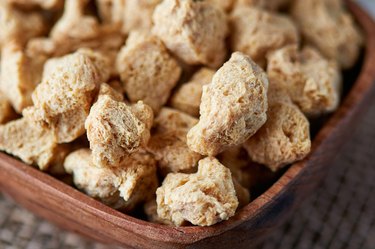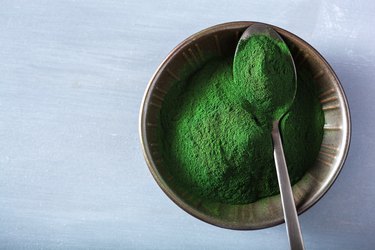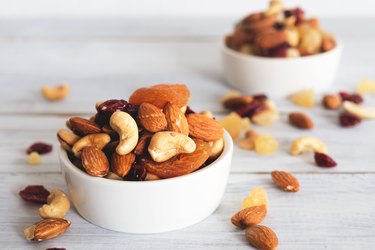
Maybe there was a sale at your local grocery store or perhaps you just thought you'd be home and cooking more than you actually were. No matter the reason, don't be so quick to throw out that container of yogurt.
Approximately 133 billion pounds of food is thrown out each year (over $160 billion worth), according to the USDA. That's 30 to 40 percent of the food supply.
Video of the Day
Video of the Day
Before you toss that tofu, take a look at some of our top healthy protein picks and how long they generally last in the fridge.
Food | Where to Store | How Long They Keep Fresh |
|---|---|---|
Tempeh | Original container | Keeps fresh in the fridge for 10 days |
Tofu | Original container | Keeps fresh in the fridge for 7 days |
Textured Vegetable Protein (TVP) | An airtight container in the refrigerator once rehydrated | Keeps fresh in the fridge for 7 days |
Spirulina algae | Original container | Keeps fresh in the fridge for 2 years |
Eggs | Original container | Raw in-shell, 3 to 5 weeks; hard-boiled, 7 days |
Yogurt | Original container in the fridge's dairy compartment | 1 month |
Legumes | An airtight container in the refrigerator | Keeps fresh in the fridge for 7 days |
Nuts and Seeds | An airtight container in the refrigerator | 6 months |
When in Doubt, Throw it Out
If you're unsure about whether a food has gone rancid and is safe to eat, just toss it! You're better off throwing it in the trash than getting an upset stomach.
1. Tempeh

Keeps fresh in the fridge for 10 days.
If you're not familiar with tempeh, it's a healthy textured soy product made of fermented soybeans. It's a delicious plant-based protein and a good source of vitamin B12, which is vital for vegetarians and vegans.
As it grows in popularity, it's become more widely available nationwide — look for it in your local grocery store in the refrigerated section near tofu and the produce areas. Pro tip: Simmer or boil the tempeh in water for 15 minutes prior to preparing.
2. Tofu

Keeps fresh in the fridge for 7 days.
Tofu, or bean curd, has become a well-known food nationwide. It's made by coagulating soy proteins, which forms curds that are pressed together to form silken, regular, firm or extra-firm blocks of tofu.
Tofu is a very good source of plant-based protein as well as manganese, selenium and phosphorous. Because tofu has a neutral taste, it is a culinary chameleon with the ability to work with a range of flavors and foods.
Silken and regular tofu work best in puréed soups, sauces, smoothies or desserts while firm or extra-firm tofus are best for baking, grilling and stir-fries.
3. Textured Vegetable Protein

Keeps fresh in the fridge for 7 days when rehydrated.
Textured vegetable protein, or TVP, is a soy-based product that is shelf-stable and generally used as a vegetarian meat substitute or meat extender for dishes that call for ground meat or poultry.
Prior to using, you will have to rehydrate it by pouring one cup of boiling water or broth over one cup of TVP; then, stir and let stand for 10 minutes. Once rehydrated, it should stay fresh in the refrigerator for up to 7 days.
4. Spirulina Algae

Keeps fresh in the fridge for 2 years.
Spirulina algae provides 7 grams of protein and a variety of essential nutrients and antioxidants in just two tablespoons. To maintain freshness, keep the container closed tightly and store it in the refrigerator.
To get more of the healthy algae in your diet, add it to smoothies, baked goods, protein bars and energy balls.
5. Eggs

Raw in-shell, 3 to 5 weeks; hard-boiled, 7 days.
One large egg provides 6.3 grams of high-quality protein plus a range of other vitamins and minerals, including vitamin B12, choline and biotin.
Eggs are an affordable, low-calorie, nutrient-dense food, costing roughly 15 cents per egg with only 70 calories, according to the Egg Nutrition Center.
6. Yogurt

Keeps fresh in the fridge for 1 month.
Yogurt, a fermented dairy product, is a very good source of protein, calcium, vitamin B12 and phosphorous, among others.
Fermented dairy products have beneficial bacteria, known as probiotics, which are associated with a variety of health benefits. Eating yogurt is associated with a decreased risk of weight gain, metabolic syndrome, heart disease and type 2 diabetes, according to a December 2018 article in Nutrition Review.
7. Legumes

Keep fresh in the fridge for 7 days.
Legumes are among the oldest of cultivated plants, encompassing more than 13,000 species such as beans, lentils, peas and chickpeas.
Legumes are a solid source of plant-based protein as well as a range of other nutrients, including dietary fiber, B vitamins and iron.
Dried legumes will keep for up to 12 months in an airtight container stored in a cool, dry, dark place. However, once cooked, legumes will stay fresh in the refrigerator for up to seven days.
8. Nuts and Seeds

Keep fresh in the fridge for 6 months.
To keep from turning rancid, nuts and seeds should be kept in the refrigerator where they will stay fresh for six months.
These protein-packed powerhouses can easily be incorporated into meals and snacks throughout your week. Nuts and seeds provide a range of nutrients, including dietary fiber, magnesium, zinc and vitamin E.